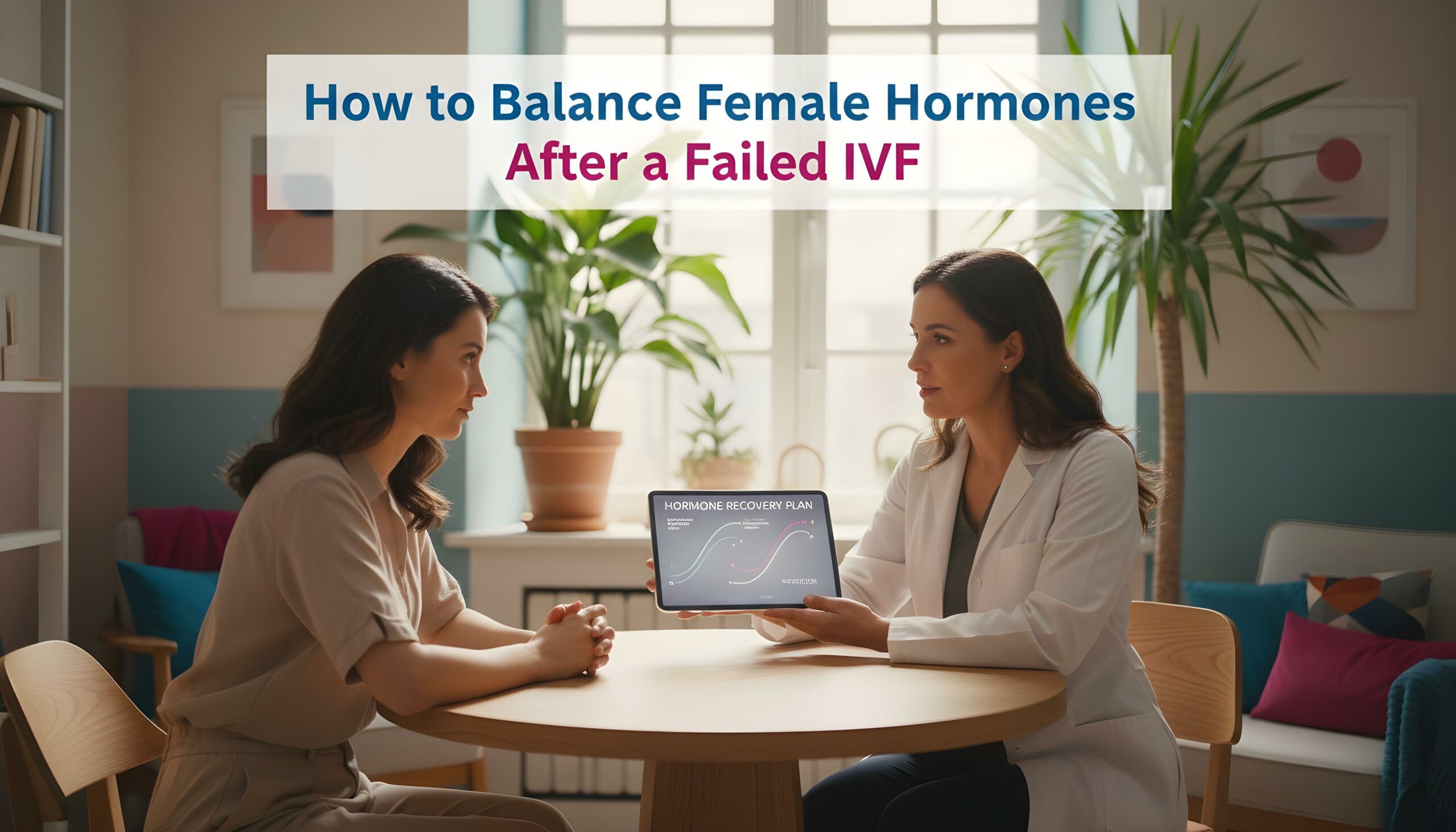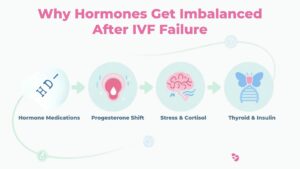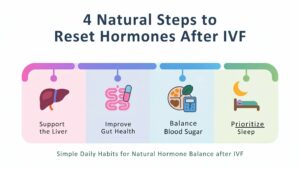If your IVF doesn’t work, you might feel emotionally and physically tired. During treatment, your hormones change a lot, so it’s normal to feel tired, moody, or “not yourself.” It’s not your fault; your body just needs some time, rest, and gentle help to get back in balance. You can slowly get better by taking care of your emotions, eating well, getting enough sleep, and moving around in a light way.
We’re here to help you if you need advice on what to do next.
Call +91 9311850412 or email info@fertilityworld.in.
Introduction
It’s not only a medical disappointment when an IVF cycle doesn’t work; it feels very personal. Your heart has gone through a lot, and so has your body. FSH, LH, progesterone, and estrogen are hormones that help you get ready for pregnancy. When they suddenly drop, your body has to find a new balance. That’s why a lot of women have a hormonal imbalance after IVF. They may feel exhausted, moody, have irregular periods, or have skin eruptions that make them feel like they’re not themselves.
You could be asking yourself, “When will my body feel normal again?” It’s true that it takes time to get well following IVF, but it is achievable. Learning how to balance hormones after IVF failure is actually about getting better both physically and mentally. Your hormones and your hope may both get back on track with the correct help, food, and care.
Why Hormones Get Imbalanced After IVF Failure
No matter if the IVF cycle worked or not, your body has gone through a lot of hormonal changes. Stress, strong fertility drugs, and emotional ups and downs can all throw off your natural balance. When your cycle ends all of a sudden, your hormones drop faster than your body can change. This can cause tiredness, mood swings, acne, bloating, or periods that come and go. Let’s look at why your hormones fluctuate after IVF and what that means for your body.
1. Hormone Stimulation Medications
Doctors use FSH and LH shots in IVF to help your ovaries make a lot of eggs all at once. When you take these drugs, your estrogen levels rise much higher than usual. But when the medicines stop working or the cycle is stopped, estrogen levels drop quickly. This is called a hormone crash after egg retrieval.
This drop can lead to short-term menopause symptoms like hot flashes, headaches, and periods that come later than usual.
| IVF Phase | Hormones Used | What Happens |
|---|---|---|
| Stimulation | FSH, LH | Ovaries produce multiple follicles and eggs |
| After stopping meds | Estrogen drops rapidly | Hormone crash → fatigue, mood swings, irregular periods |
2. Elevated Progesterone During IVF Luteal Phase
You are given progesterone supplements to get your uterus ready for implantation after the egg retrieval. For early pregnancy, progesterone keeps things stable by making the lining of the uterus thicker.
Progesterone levels drop sharply if implantation doesn’t happen, though, which can cause mood swings, cramps like PMS, breast soreness, or spotting. After an unsuccessful IVF cycle, this sudden drop in hormones is often what makes people feel bad emotionally and physically.
3. Emotional Stress and Cortisol
IVF is more than just a physical process; it’s also a mental one. When a cycle doesn’t work out, the worry, anxiety, and heartbreak that come with it raise cortisol, the body’s stress hormone, which causes emotional stress after IVF. If your cortisol levels are too high, they can mess up the way your estrogen, thyroid, and insulin work, which will slow down your healing.
This is why you might still feel tired, foggy, or mentally drained after treatment is over.
4. Thyroid and Insulin Changes
Especially in women with PCOS, IVF drugs and long-term worry can cause thyroid imbalance after IVF and insulin. Fatigue, bloating, or changes in weight can be caused by a slight thyroid imbalance or insulin resistance after IVF. These changes can also make it take longer for periods to start coming back on time.
Signs of Hormonal Imbalance After IVF
After a failed IVF cycle, it takes time for your body and mind to heal. When hormones like estrogen, progesterone, and thyroid hormones change, you will see changes in yourself. These changes will go away, but they show that your body is trying to get back into balance. If you can spot the symptoms of hormonal imbalance after IVF early on, you can get the help and support you need.
| Physical Symptoms | Emotional / Mental Symptoms |
|---|---|
| Irregular or missed periods | Anxiety, irritability, or restlessness |
| Breast tenderness or swelling | Sudden mood swings |
| Bloating and water retention | Feeling low or hopeless |
| Acne or increased hair fall | Fatigue or brain fog |
| Unexplained weight gain or loss | Low motivation or disinterest |
| Hot flashes or night sweats | Trouble sleeping or overthinking |
| Headaches or dizziness | Emotional sensitivity or tearfulness |
| Lower libido or vaginal dryness | Difficulty focusing or mental fatigue |
If you want to know how to tell if your hormones are off after IVF, pay attention to your body. These signs are not failures; they are signals. Your hormones can and will get back to normal if you get enough rest, work on your emotions, and get medical attention.
Key Hormones Affected After IVF Treatment
Your body will go through a sudden hormonal change after IVF. Stop taking the drugs that helped your ovaries make eggs and get ready for implantation right away. This is why many women experience changes in mood, energy, or even their cycle. Hormones affected by IVF just need some time to get back to normal.
| Hormone | Function | Post-IVF Effect |
|---|---|---|
| Estrogen | Builds uterine lining | Drops sharply → fatigue, irregular cycle |
| Progesterone | Supports pregnancy | Falls suddenly → PMS-like mood swings |
| FSH & LH | Stimulate egg growth | Temporarily suppressed after meds |
| Thyroid (TSH, T3, T4) | Controls metabolism | Can fluctuate due to stress |
| Cortisol | Stress hormone | Often rises after emotional strain |
| Prolactin | “Milk” & stress hormone | May rise slightly, affecting periods |
You might wonder, “How long does it take for hormones to return to normal after IVF?”
In a few weeks, your hormones should start to balance out again, but worry can slow this down. After IVF, taking care of your body gently with nutritious food, enough sleep, and managing your stress can help reset the balance of estrogen and progesterone and get your body ready for the next cycle or natural conception.
Natural Ways to Balance Hormones After Failed IVF
When you don’t get successful with IVF, your body, mind, and hormones go through a lot. Suddenly stopping IVF drugs can throw your body out of sync, which can cause mood swings, tiredness, or cycles that don’t work right. Do you know that you can balance your hormones naturally, even sitting in your own house? You may have worried about how to balance the hormones after failed IVF naturally, but here is the answer. The body is, however, perfectly made to heal itself, and with the right help, you can help your natural hormone reset after IVF. To get your body back into balance, follow these steps.
1. Support the Liver — The Body’s Detox Hub
Your liver gets rid of a lot of the hormones that are left over after IVF, especially extra estrogen. When it’s slow, hormones stay in your body longer, which makes healing take longer.
| Foods for Liver Health | Why They Help |
|---|---|
| Leafy greens (spinach, kale) | Cleanse and detoxify the liver |
| Lemon water | Supports natural liver function |
| Turmeric | Reduces inflammation and boosts bile flow |
| Beetroot and flaxseeds | Aid in estrogen metabolism |
Avoid: caffeine, alcohol, sugary, and fried foods as they make the liver work harder. Healthy hormones come from a clean liver. After IVF, one of the best natural ways to get your hormones back in balance is to take care of your liver.
2. Focus on Gut Health
Did you know your gut bacteria help manage estrogen levels? This “estrobolome” tells your body how well to break down and get rid of old hormones. Because of medications or worry, gut health can get worse after IVF.
Include these in your meals:
- Foods with probiotics, like buttermilk, yoghurt, or kefir
- Eat foods that are high in fibre, like lentils, veggies, and chia seeds.
- Berries, oats, and garlic are all examples of prebiotics.
Hormones that are happy make the gut happy, which helps in fertility recovery after an unsuccessful IVF round and prepares the body for the next cycle.
3. Balance Blood Sugar
If your blood sugar goes up and down a lot, it throws off insulin and your reproductive factors. Your thyroid and ovaries work better when your blood sugar stays steady.
| Do’s | Don’ts |
|---|---|
| Eat small, balanced meals every 3–4 hours | Skipping meals or crash diets |
| Include protein (eggs, paneer, lentils) in every meal | Sugary snacks or white bread |
| Choose complex carbs (oats, brown rice, sweet potato) | Excess caffeine or alcohol |
Keeping your sugar stable supports your estrogen and progesterone naturally, reducing mood swings and helping you feel more in control.
4. Sleep and Circadian Reset
One of the best ways to fix your hormones that doesn’t get enough attention is to get enough rest. Melatonin is a hormone that your body makes while you sleep. It helps FSH, LH, and egg production.
Checklist for Sleep:
- Get 7–8 hours of sleep every night
- Lowlights an hour before bed
- Thirty minutes before bed, put your phone away.
- You can make a calm routine before bed by taking a warm bath, listening to soft music, or meditating.
Consider sleep as the hormone treatment your body does every night. Regular rest helps control the stress hormone cortisol, gives you more energy, and brings your body back into balance.
Foods That Help Balance Hormones Post-IVF
Your body and mind go through a lot after an unsuccessful IVF cycle. However, did you know that food can help your hormones get back in balance?
Your kitchen is sometimes the easiest place to start getting better. After IVF fails, making a few small changes to your food can have a big effect on how your body feels and heals. Do you find that eating better makes you feel calmer and lighter? That’s the normal start of your system’s reset.
| Category | Foods to Include | Why It Helps |
|---|---|---|
| Protein | Eggs, fish, tofu, lentils, legumes | Keeps blood sugar steady and supports ovulation |
| Healthy Fats | Avocado, olive oil, nuts, seeds | Helps restore estrogen balance and cell health |
| Fiber | Whole grains, leafy greens, broccoli | Removes excess estrogen and supports digestion |
| Antioxidants | Berries, turmeric, green tea | Reduces inflammation and protects egg health |
| Minerals | Zinc (pumpkin seeds), magnesium (spinach, almonds) | Supports thyroid and progesterone production |
Each action matters. Balance starts with one healthy meal, one cup of green tea, and one handful of nuts. Keep in mind that your body is not broken; it’s just getting back into sync. Nourishment, rest, and hope can help your hormones, and you get better.
Supplements to Restore Hormonal Balance
You may be asking yourself, “I’ve already taken so many medicines during IVF; do I really need more?” You’re not crazy for feeling that way. When you’ve been getting shots, pills, and meetings for weeks or months, the last thing you want to hear is “take another supplement.” However, let’s be honest: these aren’t more drugs. They are natural and gentle, and they can help your body heal from the ups and downs of hormones that come with IVF.
These hormone balance supplements work in the background to help your energy, happiness, and fertility slowly get back to how they should be.
| Supplement | What It Does | When It Helps Most |
|---|---|---|
| Vitamin D | Lifts mood, supports egg quality, and balances insulin | If you feel low energy or have irregular cycles |
| Myo-Inositol | Balances insulin and LH — great for PCOS and hormonal acne | For women with PCOS or sugar imbalance |
| CoQ10 | Boosts cell energy and improves egg health | When preparing for your next IVF cycle |
| Omega-3 Fatty Acids | Reduces inflammation and balances hormones | Can be taken daily for overall hormone support |
| Magnesium & Zinc | Calm stress, regulate cortisol and estrogen | For PMS, anxiety, or poor sleep recovery |
Feeling too much? Simply do one thing at a time. Start with what your body really needs and don’t try to do everything at once.
Note: Before taking any vitamins, you should always talk to your fertility doctor. When you take these small, smart steps, they can help your body feel better, calmer, and ready for a new start.
Gentle Exercise and Yoga to Rebalance Hormones
After a failed IVF, your mind says, “Do I really need to exercise right now? Shouldn’t my body just rest after everything it’s been through?” It makes sense to think that way, but the truth is that light moving can help your body heal faster. Your hormones are still trying to find their balance after IVF. Doing yoga for hormone balance or taking mild walks will help relax your nervous system, lessen your stress, and get your period back on track.
Instead of lying still and worrying, let your body move gently so it can breathe, let go, and heal.
Walking or Swimming – The Best Exercise After IVF Failure
You don’t have to run races to get better blood flow, balance insulin, and lose weight. A 20-minute walk or slow swim is enough. It’s an easy way to let your body know that it’s still working hard to fix itself.
Think of yoga as taking care of your emotions. Yoga for fertility naturally helps keep the thyroid, adrenals, and reproductive chemicals in balance. Yoga exercises that are easy on the body and mind, like Bridge Pose, Butterfly Pose, and Legs Up the Wall, can help your body and mind heal in balance.
Meditation and Pranayama for Stress Relief
Your hormones change based on how you feel. Stress relief, fertility yoga, meditation, and breathing techniques can help lower cortisol, the stress hormone that can make recovery take longer. Mindful breathing for just 10 minutes can give you more energy and calm you down.
Medical Ways to Restore Hormones After Failed IVF
Even if your IVF cycle didn’t work, you should still feel tired because your body, feelings, and hormones are all trying to find balance again. The good news is that your body can heal and get ready for a healthy, more stable next step if you get the right medical treatment for a hormonal imbalance after IVF.
Here’s what your doctor might tell you to do to get your hormones back on track
1. Hormone Evaluation — Understanding What Your Body Needs
You can think of this as a checkup for your hormones. Your doctor may do the following tests after 4 to 6 weeks of IVF:
- FSH and LH: Check to see how your ovaries are getting better.
- AMH checks the egg reserve after activation.
- Estradiol and progesterone: Show the rhythm of the hormones after treatment.
- Thyroid and Insulin: Find out about secret imbalances that impact fertility and energy.
- These results make it clear to your doctor exactly what your body needs before the next IVF cycle.
2. Thyroid and Insulin Management
Even changes that seem small can have a big effect.
- TSH levels above 2.5 mIU/L? It could mean that your thyroid needs help.
- Insulin resistance can make healing take longer and lower the quality of eggs.
- These systems can be stabilised with simple changes to your lifestyle or light medications, which can help your hormones reset naturally.
Taking care of your insulin and thyroid levels isn’t just about numbers in the lab; it’s also about getting your body ready for a healthier, more pleasant ride in the future.
3. Progesterone Support (If Needed)
Sometimes, your body just needs a little hormonal “hug.”
- Your cycle can be balanced with short-term progesterone treatment.
- It eases the signs of PMS and helps keep the uterus healthy.
- As your cycle comes to an end, this helps your body find its natural rhythm again.
How Long It Takes for Hormones to Balance After IVF
“When will my hormones feel normal again?” is a normal question to ask yourself after IVF. That’s the truth: your body needs time to recover from all the drugs and stress. For each woman, the time it takes for her hormones to reset after IVF is different, but balance can be restored with the right care and time. At this point, your body is just readjusting itself. Don’t worry, it’s not broken.
Your cycle can be balanced with short-term progesterone treatment.
| Timeline | Body Response | Focus Area |
|---|---|---|
| 0–2 Weeks | Mild hormone withdrawal symptoms like fatigue or bloating | Focus on rest, hydration, and gentle self-care |
| 2–6 Weeks | Menstrual cycles may be irregular as your ovaries recover | Support liver detox and gut health with clean, light foods |
| 6–12 Weeks | Hormone stabilization begins; mood and energy improve | Add nutrient-rich foods and doctor-approved supplements |
| 3–6 Months | Most women experience full hormonal recovery | Build emotional strength and prepare your body for next steps |
It normally takes between 8 and 12 weeks for your hormones to start to balance out again and between 3 and 6 months to fully heal.
In other words, you’re feeling off right now, like tired, moody, or emotional, remember that your body is just getting well again. Your IVF recovery schedule will help you become calmer, stronger, and more balanced as long as you rest, eat well, and show yourself kindness.
When to See a Doctor After IVF Failure
When an IVF procedure fails, your body goes through hormonal changes that take some time to settle down. But how do you know when you need to see a doctor again? If your IVF failed, knowing when to see a fertility doctor can help you get better safely and feel ready for the next step with confidence.
Here are some times you should talk to your fertility doctor:
- You haven’t had your period in 6–8 weeks after your IVF cycle.
- For weeks, you feel very tired, have mood swings, or are depressed.
- Sudden weight gain or loss occurs without any major lifestyle changes.
- You’re planning another IVF cycle soon and want to ensure your hormones are stable.
- You are confused or worried about your healing and want to hear from a professional.
If IVF doesn’t work, your doctor may offer a hormone test to see how your body is healing. This test checks levels of thyroid, FSH, LH, and estrogen. It’s not just about moving on quickly; it’s about moving on right. A check-up now can make your next IVF attempt smoother, healthier, and give you new hope.
Preparing Your Body for the Next IVF Cycle
| Focus Area | What to Do | Why It Matters |
|---|---|---|
| Hormone Balance | Stabilize TSH, insulin, and prolactin levels | Supports healthy ovulation and embryo growth |
| Nutrition & Supplements | Follow a balanced diet rich in protein, fiber, and omega-3s | Nourishes egg quality and hormonal balance |
| Emotional Wellness | Practice mindfulness, journaling, or gentle yoga | Builds mental strength and positivity before treatment |
| Doctor Consultation | Discuss IVF protocol adjustments with your fertility expert | Personalizes treatment for better results next time |
Final Thoughts
Finding peace again is the hardest thing after IVF, not just getting better physically. It’s normal to feel tired or uncertain after giving it your all. Your body is telling you, “Let me heal first,” so this isn’t the end. It will take time, care, and kindness to yourself to get your hormones back in balance after IVF. Balance and hope are closer with each good meal, deep breath, and night’s sleep.
We think that healing is the first step to success here at Fertility World IVF Centre. Just give your body time and love to remember how to heal itself.
Your story isn’t over; it’s just starting over, so give yourself that time. Contact Fertility World today to set up your gentle recovery appointment.
How can I fix hormonal imbalance after IVF?
Take slow, small steps at first. Get 7–8 hours of sleep, eat well-balanced meals, deal with stress, and do some light exercise like yoga or walks. Supplements and foods that help your liver detox (like flaxseeds and veggies) can also help your natural hormone balance after IVF.
What foods help regulate hormones?
These foods are the best for you: avocados, nuts, olive oil, berries, leafy greens, whole grains, and foods high in fiber and healthy fats. These are good for your liver and gut, which naturally keep estrogen and progesterone levels in check.
How long does it take for hormones to reset?
Hormones start to balance out again for most women in 8–12 weeks, but it can take 3–6 months for full recovery, based on their health and stress levels. As you wait, remember that your body just needs time to recover from all the activity.
Can stress affect next IVF success?
Yes. Stress can cause high amounts of cortisol, which can mess up estrogen and thyroid hormones. This can affect the quality of the egg and its ability to implant. Getting rid of stress through yoga, meditation, or therapy can help your hormones balance and your chances of success with IVF in the future.






